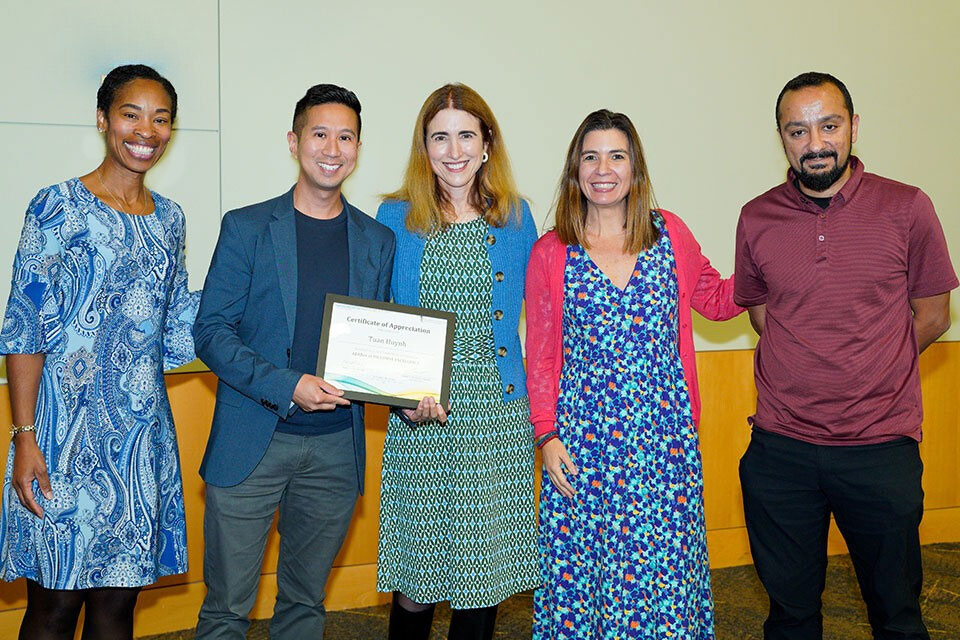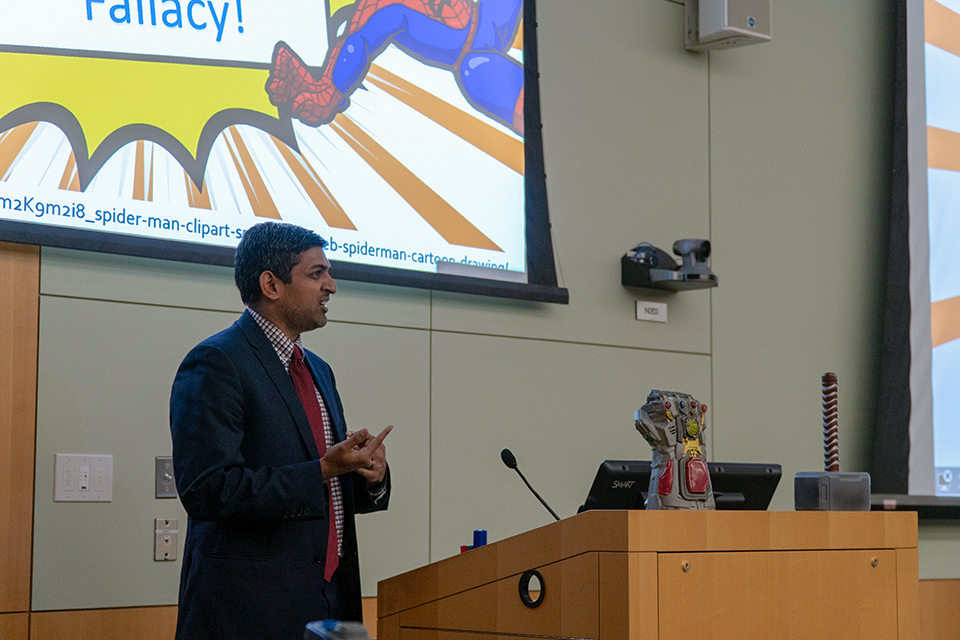Focus on ‘Inclusive Excellence’
SOP task force transforms input into vigorous initiative to advance equity, diversity, and inclusion.

By Christine Stutz
December 14, 2023
A robust initiative to advance equity, diversity, and inclusion (EDI) at the University of Maryland School of Pharmacy is well under way, about three years after a task force was established. Led by Wendy Camelo Castillo, PhD, MD, MSc, assistant professor of practice, sciences, and health outcomes research (P-SHOR), Amanda Oglesby, PhD, associate professor of pharmaceutical sciences (PSC), and Chanel Whittaker, PharmD, BCGP, FASCP, professor of P-SHOR, the 22-member task force, with representation from students, faculty, and staff, recommended priorities for bold initiatives benefiting the entire community.
In a final report, the task force recommended several priorities for the School, including:
- community building
- community competence
- community equity and accountability
- community inclusion
“This journey with EDI began in 2020, when a lot of organizations across industries were responding to structural racism and inequities that were brought to light by the COVID-19 pandemic and the killing of George Floyd,” says Whittaker. The pharmacy profession, academia, and former School of Pharmacy Dean Natalie D. Eddington, PhD ’89, FAAPS, FCP, put out statements calling upon the pharmacy community “to address new ways to eliminate health inequities and pursue a healthy future for all regardless of identity or social position,” Whittaker says.
A focus on “inclusive excellence” is taking shape under the leadership of Whittaker, who was named the School’s inaugural assistant dean for EDI in May 2022.
“We are preparing the next generation of scientists, researchers, pharmacists, and leaders. To achieve our mission as a School ‘to collaboratively and equitably improve the health of society,’ their education should include an understanding of persistent and pervasive inequities and strategies to advance equity and justice in their areas of expertise and in future roles,” Whittaker says.
One of the exciting new initiatives under the purview of the School’s Faculty Affairs committee, chaired by Oglesby, is integrating the School’s core values of “equity and justice” into its appointment, promotion, and tenure policies, says Whittaker. In 2022 alone, more than half of the faculty documented over 4,000 hours in EDI-related research and grants, civic and community engagement, professional development, and other areas.
After much discussion and exploration, the equity and justice guidelines were approved by the School of Pharmacy faculty in June.
Another significant initiative currently in progress is the integration of new competency-based outcomes for the PharmD curriculum in the areas of anti-racism and antioppression. This work is ongoing as a new curriculum is implemented for incoming students in fall 2024. In the short term, faculty, staff, and students will collaborate to develop a diversity statement that will be incorporated into the PharmD course syllabi. Throughout the process, faculty will be receiving guidance from a range of experts on how to cultivate an inclusive learning environment. During the next year, the goal is to work across all the School’s PhD and MS programs to integrate themes of equity, diversity, and inclusion.
For students, incorporating EDI values means thinking about the diverse communities they will serve as professionals, Whittaker says. What are their patients’ or participants’ lived experiences, what kind of access have they had to quality health care, or how can they be better represented in research?
The promotion and tenure initiative and curriculum updates “are incredibly important to the School,” Whittaker says, “but will take time to fully implement.” While the improvements will be made incrementally, her goals are ambitious. “We’re aiming for transformation here,” she says. “I’m going for a shift.
“To realize the vision for inclusive excellence, we need to evolve our policies and practices to better align with our mission, core values, and best practices for advancing equity, diversity, and inclusion in higher education,” she says.
A Universitywide Focus
The School’s EDI initiative is not operating in a vacuum. It’s part of a larger effort across all seven professional schools at the University of Maryland, Baltimore (UMB) that is led by Diane Forbes Berthoud, PhD, MA. As UMB’s first chief equity, diversity, and inclusion officer and vice president, Berthoud’s job, she says, is to “lead and build capacity to accomplish systemic and sustainable change.”
Berthoud came to UMB in July 2021 to review and revise policies, practices, and procedures to expand opportunities and increase representation for students, faculty, and staff. She hopes to use already available data to track improvements in diversity and access to opportunity, and to increase transparency and accountability around what the data reveal.
One of the goals for this ambitious project is to see measurable improvements in morale, satisfaction, and belonging across the campus community, Berthoud says. Accomplishing this requires specific efforts to attract and retain diverse talent pools, ensure that promotion and tenure policies reinforce EDI values, and expand access to learning and career opportunities for a wide range of abilities and backgrounds.
Some of these efforts involve collaboration between and among schools. For example, to diversify the student body in the School of Pharmacy’s PhD in Pharmaceutical Sciences (PSC) program and increase access for students who are historically under-represented in the sciences, the School is partnering with the University of Maryland School of Medicine’s Graduate Program in Life Sciences on an Initiative for Maximizing Student Development (IMSD) T32 training grant from the National Institutes of Health. The grant allows for recruitment of five students in the IMSD program per year into the PhD in PSC program.
As part of the program, the School of Pharmacy has developed workshops for research reproducibility and rigor and in grant writing that are offered to students in the IMSD program before their entry into the PhD program. Additionally, they have an opportunity to rotate with faculty in the summer before their first year of classes.
These opportunities allow them to adjust to campus life and develop relationships with fellow students. Additionally, the School is planning workshops for students and mentors to address communication between faculty and students from culturally diverse backgrounds, as well as education on microaggressions and how to foster open dialogue.
Another important piece of the overall EDI initiative is the School of Pharmacy staff, particularly in the areas of inclusion and belonging, Whittaker says. Employees completed a staff experience survey in fall 2022, as part of a UMB effort to support well-being for all. “A goal for the coming year is to partner with staff to foster an inclusive work environment through professional development opportunities, creating an infrastructure for affinity groups, and to consider other strategies to amplify staff voice in the organization,” she says.
Tailored to the Individual
For Andrew Coop, PhD, professor of PSC, associate dean for academic affairs, and interim associate dean for graduate programs, the top priority for the School’s EDI effort is the accessibility piece. “When we mention EDI, we often think in terms of races and demographics,” he says. “I would like to bring out accessibility, to have us deliver education in a way that every individual reaches their potential.”
Coop notes that student demographics are changing, and that today’s students arrive at pharmacy school with different learning styles and different needs. Some students speak English as a second language. Others have sensory challenges that make video captioning and audio narration a necessity.
Offering classes in different modalities is something else the School is exploring, along with many other institutions of higher learning. “We are primarily an in-person school,” says Coop, “and we need to offer a range of in-person courses and virtual courses.” He adds that while many required courses need to be offered in person, there are electives that lend themselves to online learning.
The School is undergoing “the biggest revision of the PharmD curriculum in 20 years,” says Coop, who has been teaching at the School since 1999. In town halls on EDI initiatives, students have been asking for more opportunities to learn about structural racism and how it impacts health outcomes. And the School is responding. Currently, only one course in the PharmD curriculum, Health Policy and Systems, does a good job of incorporating these themes, he says. In a few years, these themes will be presented “by all faculty, in all courses,” he adds.
“We need to listen to our students,” Coop says. “They are far more in touch.”
This article originally appeared in the Fall 2023 issue of Capsule Magazine.



